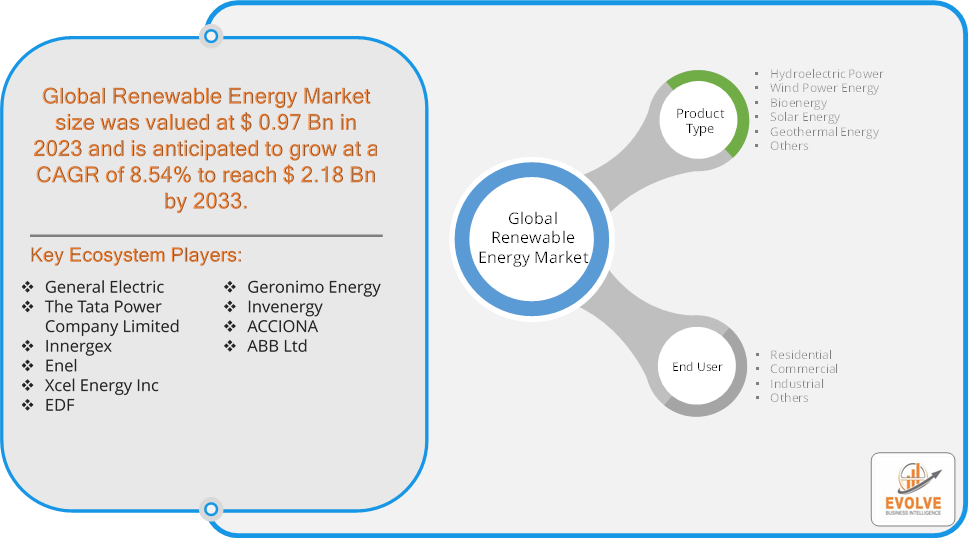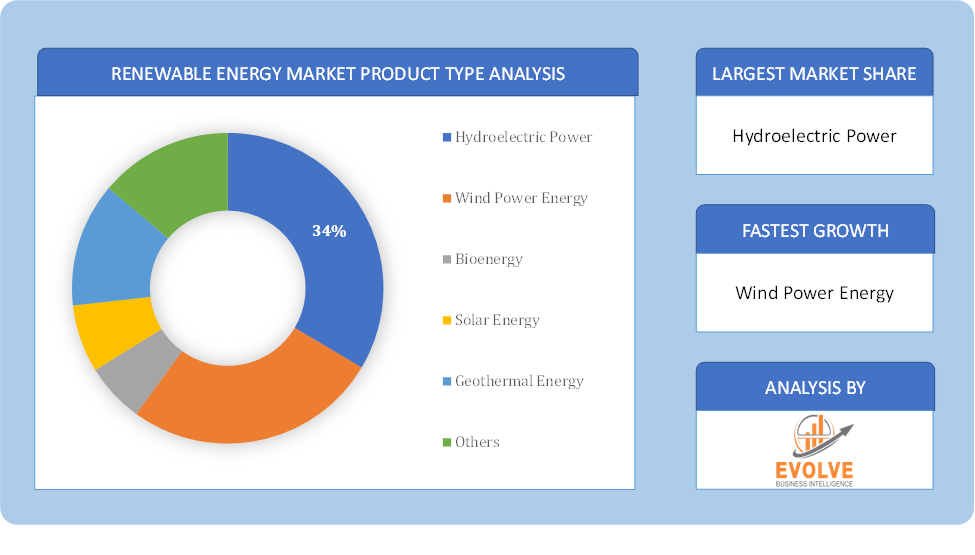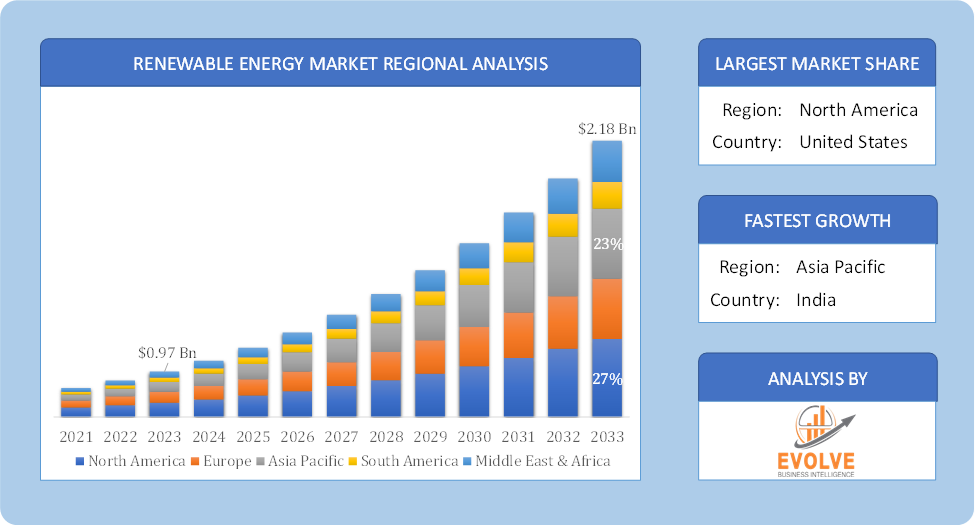Renewable Energy Market Analysis and Global Forecast 2023-2033
$ 1,390.00 – $ 5,520.00Price range: $ 1,390.00 through $ 5,520.00
Renewable Energy Market Research Report: Information By Product Type (Hydroelectric Power, Wind Power Energy, Bioenergy, Solar Energy, Geothermal Energy, Others), By End-User (Residential, Commercial, Industrial, Others), and by Region — Forecast till 2033
Page: 161
Renewable Energy Market Overview
The Renewable Energy Market Size is expected to reach USD 2.18 Billion by 2033. The Renewable Energy Market industry size accounted for USD 0.97 Billion in 2023 and is expected to expand at a compound annual growth rate (CAGR) of 8.54% from 2023 to 2033. The Renewable Energy Market refers to the global industry focused on the production, distribution, and consumption of energy generated from renewable sources. These sources include solar, wind, hydroelectric, geothermal, and biomass, which are naturally replenished and sustainable over the long term. The market encompasses various segments, technologies, and services aimed at generating electricity, heating, and transportation fuel while reducing reliance on fossil fuels and minimizing environmental impact.
The renewable energy market is a dynamic and rapidly evolving sector, crucial for transitioning towards a more sustainable and low-carbon future. It’s driven by increasing concern about climate change and the need to reduce greenhouse gas emissions and Declining costs of renewable energy technologies.
Global Renewable Energy Market Synopsis
 COVID-19 Impact Analysis
COVID-19 Impact Analysis
The COVID-19 pandemic had a significant impact on the Renewable Energy Market. Lockdowns and restrictions affected the manufacturing and transportation of key components, such as solar panels and wind turbines, leading to project delays. Many renewable energy projects faced delays due to logistical challenges and uncertainty in financial markets. Lockdowns led to a temporary decline in energy demand, affecting the revenue streams for renewable energy producers. Continued and increased commitment to climate goals and renewable energy targets, reinforcing the transition to sustainable energy systems. The pandemic emphasized the need for resilient energy systems, leading to increased investment in decentralized energy solutions like microgrids and local generation. With more people working from home, there was a heightened interest in residential solar installations to reduce energy costs and increase energy independence. The pandemic accelerated the adoption of digital tools and technologies in the renewable energy sector, improving operational efficiency and project management.
Renewable Energy Market Dynamics
The major factors that have impacted the growth of Renewable Energy Market are as follows:
Drivers:
Ø Technological Advancements
Advances in technology have led to more efficient solar panels, wind turbines, and energy storage solutions, increasing the feasibility and attractiveness of renewable projects. Developments in battery storage and other technologies enable better integration of intermittent renewable sources into the grid, improving reliability and performance. Consumers are becoming more environmentally conscious and are demanding cleaner energy options, influencing both policy and market trends. The rise of prosumers (consumers who produce their own energy) with residential solar and small-scale wind installations is changing the dynamics of energy consumption and production. Investment in smart grids and infrastructure improvements facilitates the integration of renewable energy sources and enhances grid reliability and efficiency. The development of microgrids supports the use of renewable energy in remote or underserved areas, increasing energy access and resilience.
Restraint:
- Perception of High Initial Costs and Interconnection Issues
The initial capital required for renewable energy projects, such as solar farms or wind turbines, can be high. This includes costs for equipment, installation, and infrastructure development. Securing funding for large-scale renewable projects can be difficult, particularly in regions with less developed financial markets or economic instability. Integrating renewable energy into the existing energy infrastructure can be complex, requiring sophisticated grid management and balancing mechanisms.
Opportunity:
⮚ Energy Storage Solutions
Advances in battery technology, including lithium-ion and solid-state batteries, enhance the ability to store and dispatch renewable energy, addressing intermittency issues and increasing grid reliability. Innovations in pumped hydro storage, compressed air energy storage, and thermal storage present additional opportunities for balancing supply and demand. Renewable energy can play a key role in climate change adaptation strategies, including enhancing energy resilience and supporting recovery efforts from natural disasters. Alignment with global sustainability and development goals, such as the UN’s Sustainable Development Goals (SDGs), creates opportunities for funding and collaboration on renewable energy projects.
Renewable Energy Market Segment Overview
 By Product Type
By Product Type
Based on Product Type, the market is segmented based on Hydroelectric Power, Wind Power Energy, Bioenergy, Solar Energy, Geothermal Energy and Others. The solar energy renewable segment dominated the market. Due to their ability to turn sunlight directly into power, solar panels are a fantastic solution for residences and businesses in sunny regions. Solar panels require a big amount of space to perform effectively, and the original cost and continuous maintenance of solar panels can be significant.
By End User
Based on End User, the market segment has been divided into Residential, Commercial, Industrial and Others. The residential segment dominated the renewable energy market. The market is anticipated to expand due to the rising popularity of geothermal heat pumps for home heating applications. Along with the rise in electricity demand, there will likely be a major increase in the need for geothermal energy. This element will likely fuel the market’s expansion.
Global Renewable Energy Market Regional Analysis
Based on region, the global Renewable Energy Market has been divided into North America, Europe, Asia-Pacific, the Middle East & Africa, and Latin America. North America is projected to dominate the use of the Renewable Energy Market followed by the Asia-Pacific and Europe regions.
 Renewable Energy North America Market
Renewable Energy North America Market
North America holds a dominant position in the Renewable Energy Market. United States is one of the largest renewable energy markets globally, driven by substantial investments in solar, wind, and bioenergy. Rapid growth in solar power, with a focus on large-scale solar farms and residential installations. Wind energy also continues to expand, particularly in the Midwest. In Canada, there is Significant investment in hydroelectric power, which constitutes the majority of Canada’s renewable energy generation. Growing interest in wind and solar energy, with new projects and technological advancements contributing to market growth.
Renewable Energy Asia-Pacific Market
The Asia-Pacific region has indeed emerged as the fastest-growing market for the Renewable Energy Market industry. China is the largest renewable energy market in the world, with significant investments in solar, wind, and hydroelectric power. Dominates global solar photovoltaic (PV) production and deployment, with major expansions in wind energy and a growing focus on energy storage. In India there is rapidly growing renewable energy market with a focus on solar and wind energy. Expansion of solar power projects, including large-scale solar parks and increased investments in wind energy.
Competitive Landscape
The global Renewable Energy Market is highly competitive, with numerous players offering a wide range of software solutions. The competitive landscape is characterized by the presence of established companies, as well as emerging startups and niche players. To increase their market position and attract a wide consumer base, the businesses are employing various strategies, such as product launches, and strategic alliances.
Prominent Players:
- General Electric
- The Tata Power Company Limited
- Innergex
- Enel
- Xcel Energy Inc
- EDF
- Geronimo Energy
- Invenergy
- ACCIONA
- ABB Ltd
Key Development
In April 2021, Walmart said that it had installed 6.5 MW of solar power systems, created by Sol Customer Solutions, at seven of its stores in California. Additionally, Bank of America (BOA) was the tax-equity partner, and the portfolio included a combination of solar power systems installed on parking lot rooftops and carports that cost around US$10 million.
In April 2020, Engie and Eocycle-XANT formed a collaboration so that Engie could offer wind turbines in Belgium. Engie is tasked for gathering customer demands and requirements and transmitting them to Eocycle-XANT, who will handle the installation and upkeep of the wind turbines the customer is provided.
Scope of the Report
Global Renewable Energy Market, by Product Type
- Hydroelectric Power
- Wind Power Energy
- Bioenergy
- Solar Energy
- Geothermal Energy
- Others
Global Renewable Energy Market, by End User
- Residential
- Commercial
- Industrial
- Others
Global Renewable Energy Market, by Region
- North America
- US
- Canada
- Mexico
- Europe
- UK
- Germany
- France
- Italy
- Spain
- Benelux
- Nordic
- Rest of Europe
- Asia Pacific
- China
- Japan
- South Korea
- Indonesia
- Austalia
- Malaysia
- India
- Rest of Asia Pacific
- South America
- Brazil
- Argentina
- Rest of South America
- Middle East & Africa
- Saudi Arabia
- UAE
- Egypt
- South Africa
- Rest of Middle East & Africa
| Parameters | Indicators |
|---|---|
| Market Size | 2033: USD 2.18 Billion |
| CAGR (2023-2033) | 8.54% |
| Base year | 2022 |
| Forecast Period | 2023-2033 |
| Historical Data | 2021 (2017 to 2020 On Demand) |
| Report Coverage | Revenue Forecast, Competitive Landscape, Growth Factors, and Trends |
| Key Segmentations | Product Type, End User |
| Geographies Covered | North America, Europe, Asia-Pacific, South America, Middle East, Africa |
| Key Vendors | General Electric, The Tata Power Company Limited, Innergex, Enel, Xcel Energy Inc, EDF, Geronimo Energy, Invenergy, ACCIONA and ABB Ltd. |
| Key Market Opportunities | · Energy Storage Solutions · Climate Change Adaptation and Resilience |
| Key Market Drivers | · Technological Advancements · Consumer Demand and Infrastructure Development |
REPORT CONTENT BRIEF:
- High-level analysis of the current and future Renewable Energy Market trends and opportunities
- Detailed analysis of current market drivers, restraining factors, and opportunities in the future
- Renewable Energy Market historical market size for the year 2021, and forecast from 2023 to 2033
- Renewable Energy Market share analysis at each product level
- Competitor analysis with detailed insight into its product segment, Government & Defense strength, and strategies adopted.
- Identifies key strategies adopted including product launches and developments, mergers and acquisitions, joint ventures, collaborations, and partnerships as well as funding taken and investment done, among others.
- To identify and understand the various factors involved in the global Renewable Energy Market affected by the pandemic
- To provide a detailed insight into the major companies operating in the market. The profiling will include the Government & Defense health of the company’s past 2-3 years with segmental and regional revenue breakup, product offering, recent developments, SWOT analysis, and key strategies.
Frequently Asked Questions (FAQ)
What is the study period of this market?
The study period of the global Renewable Energy Market is 2021- 2033
What is the growth rate of the global Renewable Energy Market?
The global Renewable Energy Market is growing at a CAGR of 8.54% over the next 10 years
Which region has the highest growth rate in the market of Renewable Energy Market?
Asia Pacific is expected to register the highest CAGR during 2023-2033
Which region has the largest share of the global Renewable Energy Market?
North America holds the largest share in 2022
Who are the key players in the global Renewable Energy Market?
General Electric, The Tata Power Company Limited, Innergex, Enel, Xcel Energy Inc, EDF, Geronimo Energy, Invenergy, ACCIONA and ABB Ltd are the major companies operating in the market.
Do you offer Post Sale Support?
Yes, we offer 16 hours of analyst support to solve the queries
Do you sell particular sections of a report?
Yes, we provide regional as well as country-level reports. Other than this we also provide a sectional report. Please get in contact with our sales representatives.
Press Release

Global Pharmaceutical Manufacturing Market to Reach $1.38 Trillion by 2035 with 7.35% CAGR, New Research Shows

The Global Mammography Market Is Estimated To Record a CAGR of Around 10.29% During The Forecast Period

Glue Stick Market to Reach USD 2.35 Billion by 2034

Podiatry Service Market to Reach USD 11.88 Billion by 2034

Microfluidics Technology Market to Reach USD 32.58 Billion by 2034

Ferric Chloride Market to Reach USD 10.65 Billion by 2034

Family Practice EMR Software Market to Reach USD 21.52 Billion by 2034

Electric Hairbrush Market to Reach USD 15.95 Billion by 2034

Daily Bamboo Products Market to Reach USD 143.52 Billion by 2034

Cross-border E-commerce Logistics Market to Reach USD 112.65 Billion by 2034
Table of Content
Chapter 1. Executive Summary Chapter 2. Scope Of The Study 2.1. Market Definition 2.2. Scope Of The Study 2.2.1. Objectives of Report 2.2.2. Limitations 2.3. Market Structure Chapter 3. Evolve BI Methodology Chapter 4. Market Insights and Trends 4.1. Supply/ Value Chain Analysis 4.1.1. Raw End Users Providers 4.1.2. Manufacturing Process 4.1.3. Distributors/Retailers 4.1.4. End-Use Industry 4.2. Porter’s Five Forces Analysis 4.2.1. Threat Of New Entrants 4.2.2. Bargaining Power Of Buyers 4.2.3. Bargaining Power Of Suppliers 4.2.4. Threat Of Substitutes 4.2.5. Industry Rivalry 4.3. Impact Of COVID-19 on the Renewable Energy Market 4.3.1. Impact on Market Size 4.3.2. End-Use Industry Trend, Preferences, and Budget Impact 4.3.3. Regulatory Framework/Government Policies 4.3.4. Key Players' Strategy to Tackle Negative Impact 4.3.5. Opportunity Window 4.4. Technology Overview 12.28. Macro factor 4.6. Micro Factor 4.7. Demand Supply Gap Analysis of the Renewable Energy Market 4.8. Import Analysis of the Renewable Energy Market 4.9. Export Analysis of the Renewable Energy Market Chapter 5. Market Dynamics 5.1. Introduction 5.2. DROC Analysis 5.2.1. Drivers 5.2.2. Restraints 5.2.3. Opportunities 5.2.4. Challenges 5.3. Patent Analysis 5.4. Industry Roadmap 5.5. Parent/Peer Market Analysis Chapter 6. Global Renewable Energy Market, By Product Type 6.1. Introduction 6.2. Hydroelectric Power 6.3. Wind Power Energy 6.4. Bioenergy 6.5. Solar Energy 6.6. Geothermal Energy 6.7. Others Chapter 7. Global Renewable Energy Market, By End User 7.1. Introduction 7.2. Residential 7.3. Commercial 7.4. Industrial 7.5. Others Chapter 8. Global Renewable Energy Market, By Region 8.1. Introduction 8.2. North America 8.2.1. Introduction 8.2.2. Driving Factors, Opportunity Analyzed, and Key Trends 8.2.3. Market Size and Forecast, By Country, 2023-2033 8.2.4. Market Size and Forecast, By Product Type, 2023-2033 8.2.5. Market Size and Forecast, By End User, 2023-2033 8.2.6. US 8.2.6.1. Introduction 8.2.6.2. Driving Factors, Opportunity Analyzed, and Key Trends 8.2.6.3. Market Size and Forecast, By Product Type, 2023-2033 8.2.6.4. Market Size and Forecast, By End User, 2023-2033 8.2.7. Canada 8.2.7.1. Introduction 8.2.7.2. Driving Factors, Opportunity Analyzed, and Key Trends 8.2.7.4. Market Size and Forecast, By Product Type, 2023-2033 8.2.7.5. Market Size and Forecast, By End User, 2023-2033 8.3. Europe 8.3.1. Introduction 8.3.2. Driving Factors, Opportunity Analyzed, and Key Trends 8.3.3. Market Size and Forecast, By Country, 2023-2033 8.3.4. Market Size and Forecast, By Product Type, 2023-2033 8.3.5. Market Size and Forecast, By End User, 2023-2033 8.3.6. Germany 8.3.6.1. Introduction 8.3.6.2. Driving Factors, Opportunity Analyzed, and Key Trends 8.3.6.3. Market Size and Forecast, By Product Type, 2023-2033 8.3.6.4. Market Size and Forecast, By End User, 2023-2033 8.3.7. France 8.3.7.1. Introduction 8.3.7.2. Driving Factors, Opportunity Analyzed, and Key Trends 8.3.7.3. Market Size and Forecast, By Product Type, 2023-2033 8.3.7.4. Market Size and Forecast, By End User, 2023-2033 8.3.8. UK 8.3.8.1. Introduction 8.3.8.2. Driving Factors, Opportunity Analyzed, and Key Trends 8.3.8.3. Market Size and Forecast, By Product Type, 2023-2033 8.3.8.4. Market Size and Forecast, By End User, 2023-2033 8.3.9. Italy 8.3.9.1. Introduction 8.3.9.2. Driving Factors, Opportunity Analyzed, and Key Trends 8.3.9.3. Market Size and Forecast, By Product Type, 2023-2033 8.3.9.4. Market Size and Forecast, By End User, 2023-2033 8.3.11. Rest Of Europe 8.3.11.1. Introduction 8.3.11.2. Driving Factors, Opportunity Analyzed, and Key Trends 8.3.11.3. Market Size and Forecast, By Product Type, 2023-2033 8.3.11.4. Market Size and Forecast, By End User, 2023-2033 8.4. Asia-Pacific 8.4.1. Introduction 8.4.2. Driving Factors, Opportunity Analyzed, and Key Trends 8.4.3. Market Size and Forecast, By Country, 2023-2033 8.4.4. Market Size and Forecast, By Product Type, 2023-2033 8.12.28. Market Size and Forecast, By End User, 2023-2033 8.4.6. China 8.4.6.1. Introduction 8.4.6.2. Driving Factors, Opportunity Analyzed, and Key Trends 8.4.6.3. Market Size and Forecast, By Product Type, 2023-2033 8.4.6.4. Market Size and Forecast, By End User, 2023-2033 8.4.7. India 8.4.7.1. Introduction 8.4.7.2. Driving Factors, Opportunity Analyzed, and Key Trends 8.4.7.3. Market Size and Forecast, By Product Type, 2023-2033 8.4.7.4. Market Size and Forecast, By End User, 2023-2033 8.4.8. Japan 8.4.8.1. Introduction 8.4.8.2. Driving Factors, Opportunity Analyzed, and Key Trends 8.4.8.3. Market Size and Forecast, By Product Type, 2023-2033 8.4.8.4. Market Size and Forecast, By End User, 2023-2033 8.4.9. South Korea 8.4.9.1. Introduction 8.4.9.2. Driving Factors, Opportunity Analyzed, and Key Trends 8.4.9.3. Market Size and Forecast, By Product Type, 2023-2033 8.4.9.4. Market Size and Forecast, By End User, 2023-2033 8.4.10. Rest Of Asia-Pacific 8.4.10.1. Introduction 8.4.10.2. Driving Factors, Opportunity Analyzed, and Key Trends 8.4.10.3. Market Size and Forecast, By Product Type, 2023-2033 8.4.10.4. Market Size and Forecast, By End User, 2023-2033 8.5. Rest Of The World (RoW) 8.5.1. Introduction 8.5.2. Driving Factors, Opportunity Analyzed, and Key Trends 8.5.3. Market Size and Forecast, By Product Type, 2023-2033 8.5.4. Market Size and Forecast, By End User, 2023-2033 Chapter 9. Company Landscape 9.1. Introduction 9.2. Vendor Share Analysis 9.3. Key Development Analysis 9.4. Competitor Dashboard Chapter 10. Company Profiles 10.1. General Electric 10.1.1. Business Overview 10.1.2. Government & Defense Analysis 10.1.2.1. Government & Defense – Existing/Funding 10.1.3. Product Portfolio 10.1.4. Recent Development and Strategies Adopted 10.1.5. SWOT Analysis 10.2. The Tata Power Company Limited 10.2.1. Business Overview 10.2.2. Government & Defense Analysis 10.2.2.1. Government & Defense – Existing/Funding 10.2.3. Product Portfolio 10.2.4. Recent Development and Strategies Adopted 10.2.5. SWOT Analysis 10.3. Innergex 10.3.1. Business Overview 10.3.2. Government & Defense Analysis 10.3.2.1. Government & Defense – Existing/Funding 10.3.3. Product Portfolio 10.3.4. Recent Development and Strategies Adopted 10.3.5. SWOT Analysis 10.4. Enel 10.4.1. Business Overview 10.4.2. Government & Defense Analysis 10.4.2.1. Government & Defense – Existing/Funding 10.4.3. Product Portfolio 10.4.4. Recent Development and Strategies Adopted 10.12.28. SWOT Analysis 10.5. Xcel Energy Inc 10.5.1. Business Overview 10.5.2. Government & Defense Analysis 10.5.2.1. Government & Defense – Existing/Funding 10.5.3. Product Portfolio 10.5.4. Recent Development and Strategies Adopted 10.5.5. SWOT Analysis 10.6. EDF 10.6.1. Business Overview 10.6.2. Government & Defense Analysis 10.6.2.1. Government & Defense – Existing/Funding 10.6.3. Product Portfolio 10.6.4. Recent Development and Strategies Adopted 10.6.5. SWOT Analysis 10.7. Geronimo Energy 10.7.1. Business Overview 10.7.2. Government & Defense Analysis 10.7.2.1. Government & Defense – Existing/Funding 10.7.3. Product Portfolio 10.7.4. Recent Development and Strategies Adopted 10.7.5. SWOT Analysis 10.8 Invenergy 10.8.1. Business Overview 10.8.2. Government & Defense Analysis 10.8.2.1. Government & Defense – Existing/Funding 10.8.3. Product Portfolio 10.8.4. Recent Development and Strategies Adopted 10.8.5. SWOT Analysis 10.9 ACCIONA 10.9.1. Business Overview 10.9.2. Government & Defense Analysis 10.9.2.1. Government & Defense – Existing/Funding 10.9.3. Product Portfolio 10.9.4. Recent Development and Strategies Adopted 10.9.5. SWOT Analysis 10.10. ABB Ltd 10.10.1. Business Overview 10.10.2. Government & Defense Analysis 10.10.2.1. Government & Defense – Existing/Funding 10.10.3. Product Portfolio 10.10.4. Recent Development and Strategies Adopted 10.10.5. SWOT Analysis
Connect to Analyst
Research Methodology



 Renewable Energy North America Market
Renewable Energy North America Market

